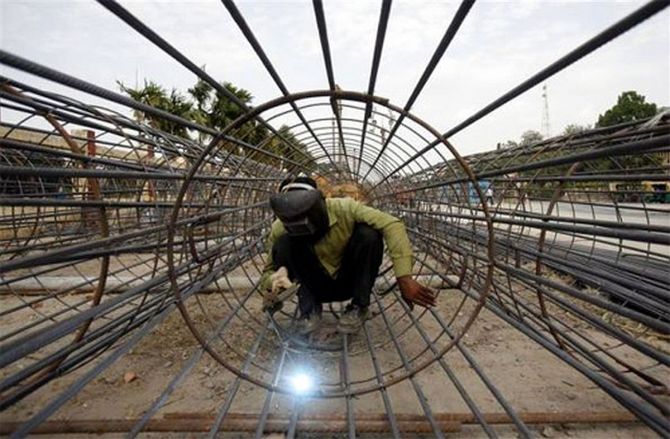Engineering & construction sector: 10 cos likely to see solid growth in FY24
The engineering and construction (E&C) sector delivered an excellent performance in the last two financial years (FY2021-22 or FY22 and FY23’s nine-months) and there’s reason to believe that FY24 will also see outperformance.

The sector has emerged from the pandemic with stronger balance sheets and more rational cost structures.
It has a big order book and it should see new order flows accelerate in FY24.
Central Budgetary support for infrastructure creation was a key reason for the strong past performance and as elections draw nearer, this allocation may be ramped up.
Historically, government Budgetary expenditure goes up, the year before a General Election and given strong tax collections, this pattern should repeat in FY24.
In addition, there are signs that private capex is visibly improving, with Larsen & Toubro (L&T) winning its biggest private order in four years.
In aggregate, the sector’s order book is around 3x of the current annual execution levels, implying that the sector has enough to keep going till FY25, at least, even if the pace of work improves.
In addition, the margin outlook has improved due to the cooling off in the commodities sector.
Global and domestic prices of steel and bitumen have fallen considerably since April 2022 and diesel prices have stabilised due to recessionary conditions.
This should boost operating profit margins. There are still supply issues with semiconductors, but this is expected to ease progressively.
Industrial capex is picking up, with industries like domestic steel producers above 80 per cent utilisation.
Given known expansion plans, capacities in steel and cement could more or less double over the FY22-FY25 period.
The PLI (production linked incentive) driven capex should also kick in, as new manufacturing facilities get off the mark.
Capex from PLI is expected to hit Rs 1 trillion from FY24 and will contribute between 20-25 per cent of total capex in FY24.
Analysts are projecting that the combination of strong order flow and margin expansions should result in minimum earnings growth rates of 15 per cent CAGR (compound annual growth rate) during FY23-FY25 with specific companies doing much better.
This assumes we are early into a sustainable new capex upcycle, with both government and private sector investment slated to rise, and the cushion of existing strong order books.
Typically, the companies which could gain include L&T, NCC, ABB, Thermax, Engineers India, Cummins, BHEL, Siemens, IRB and J Kumar Infra (JKIL).
Apart from the E&C players, and steel and cement producers, this will lead to strong demand for products like bearings, construction equipment, material handling equipment, boilers, abrasives, refractories, industrial tools and ceramics, air compressors, etc.
Since this is a capital-intensive sector, credit demand should also rise.
Banks typically find project finance and infra finance hard to handle due to asset-liability mismatches caused by long gestations and back-loaded cash flows.
This is worth watching because the sector may tap the bond market, as well as raise debt from lender consortiums and specialised institutions.
Since inflation is high, and policy interest rates are expected to rise further, the cost of finance will be a key input.
Valuations in terms of enterprise value/Ebitda (earnings before interest, tax, depreciation and amortization) and PE ratios are not low. But given the expected boost to revenues, Ebitda and earnings, the valuations appear sustainable and could even improve if toplines rise by 20-25 per cent.
Source: Read Full Article

